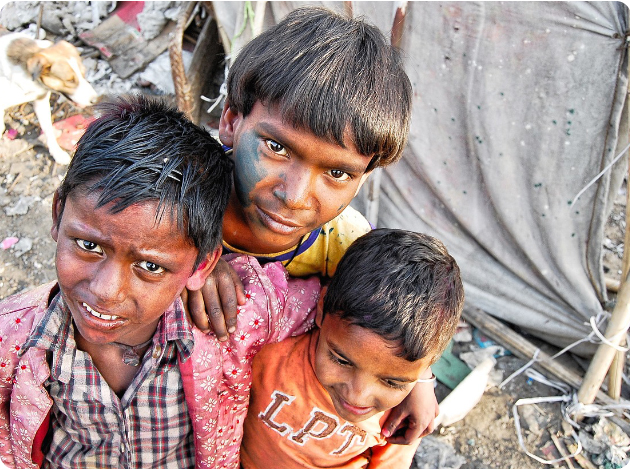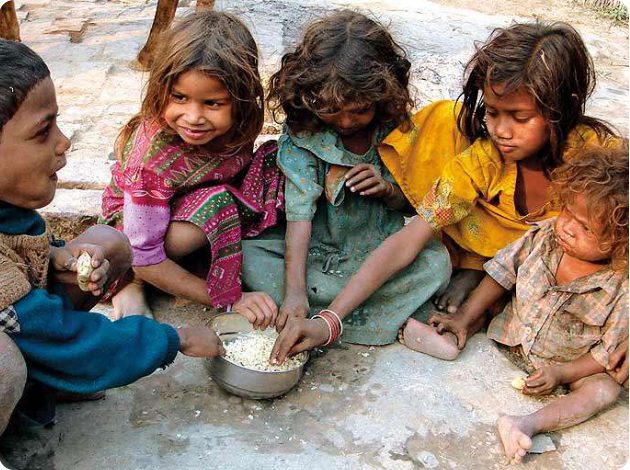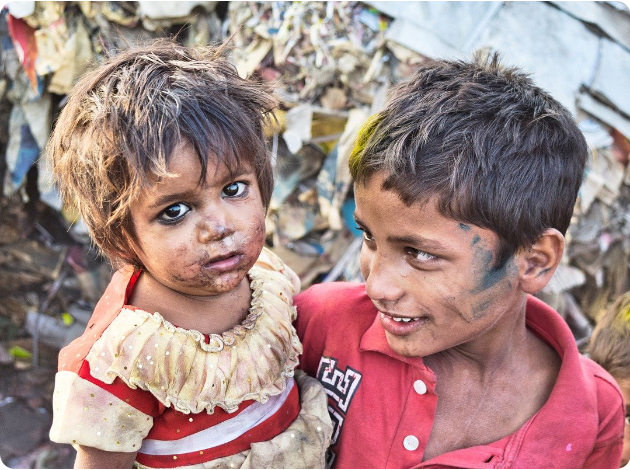





homeless children's


Donate Now
A Little Help Is What They Need
Tax benefits under section 80G

Underprivileged children
Children are a nation's future. A privilege is a right and individuals who are disadvantaged do not have these rights or benefits.

Climate change
Our important contributions to the environment to address climate change to safeguard ill children were about 0.98 Celsius degrees warmer in 2020 than the 20th-century average.

Sanitization
Around the world, sanitation is an essential component of health and development; Growing up in a clean and healthy environment is every child's right.

Poverty
Poverty is more than a lack of income and resources to support a healthy lifestyle. We seek to alleviate poverty of children.

Helping Small Hands Do Big Things
Children are a nation’s future. They are the most effective change makers, whether in their family or in the community in which they reside. It is so critical to assist youngsters, to catch them young and to instil in them emotions of empathy and conscience so that they grow up to be responsible individuals. Throughout 1 billion children are multidimensionally poor around the world, which means they lack basic essentials such as food and clean water. 356 million children are projected to be living in abject poverty.
Helping Small Hands Do Big Things
Children are a nation’s future. They are the most effective change makers, whether in their family or in the community in which they reside. It is so critical to assist youngsters, to catch them young and to instil in them emotions of empathy and conscience so that they grow up to be responsible individuals. Throughout 1 billion children are multidimensionally poor around the world, which means they lack basic essentials such as food and clean water. 356 million children are projected to be living in abject poverty.

Climate change has no bounds
The Fulora Foundation provides significant contributions to the environment, community, and global sustainability. We take immediate action to address climate change and its consequences; strong scientific evidence currently demonstrates that the earth’s climate system has altered since the pre-industrial period, and that these changes are attributed, at least in part, to human activity. Climate change is increasingly becoming a societal issue, affecting security, health, agriculture, nature, and a variety of other areas. Adaptation and mitigation are both important parts of a successful climate change plan.
Healthcare is much out of reach for the average person. Only around 75% of healthcare resources are concentrated in metropolitan regions, which account for only 27% of the total population. Even the most urgent medical attention is more than 30 kilometres away for 31% of India’s rural population. In metropolitan and major cities, around 40% of the population lives in urban slums, where health posts offer primary healthcare. The majority of health clinics are located outside the slum neighbourhoods, making them difficult to reach.

23 Cities
Wide footprint and reach, we impact children at risk corners of India.
1M hours
Over 3800 passionate volunteers and fellows on the ground in 60 shelters create million hours of volunteering in a year.
600k
10th standard with us, 46 % First Class Honours, compared to a national average of fewer than 50% finishing their 10th.
96% Pass
Their 10th standard with us, with 46% getting First Class Honours, as compared to a norm of less than 50% even completing their 10th.
92% Pass
MAD passed their Grade 12 exams 51% of the time with First Class Honours, compared to a CNCP demographic average of 17%.
1 :5 Ratio
We maintain a 1:5 teacher-to-student ratio to give individualized attention, care, and support to the children we work with.

Maintain a healthy atmosphere
Growing up in a clean and healthy environment is every child’s right, according to the Fulora Foundation, which emphasises the significance of sensitization in helping to address the health and sanitation crisis in rural areas. Children who have access to clean water, basic toilets, and decent hygiene habits not only thrive, but also have a better start in life. The Fulora Foundation emphasises the importance of sensitization in helping to address the health and sanitation problem in rural regions, claiming that every kid has the right to grow up in a clean and healthy environment. Children who have access to clean water, adequate toilets, and good hygiene practises flourish and have a better start in life. Human activities, notably the burning of fossil fuels, have introduced enough carbon dioxide and other greenhouse gases into the lower atmosphere during the previous 50 years to trap more heat and impact global temperature.
Maintain a healthy atmosphere
Growing up in a clean and healthy environment is every child’s right, according to the Fulora Foundation, which emphasises the significance of sensitization in helping to address the health and sanitation crisis in rural areas. Children who have access to clean water, basic toilets, and decent hygiene habits not only thrive, but also have a better start in life. The Fulora Foundation emphasises the importance of sensitization in helping to address the health and sanitation problem in rural regions, claiming that every kid has the right to grow up in a clean and healthy environment. Children who have access to clean water, adequate toilets, and good hygiene practises flourish and have a better start in life. Human activities, notably the burning of fossil fuels, have introduced enough carbon dioxide and other greenhouse gases into the lower atmosphere during the previous 50 years to trap more heat and impact global temperature.

Poverty weakens a person, but it cannot defeat culture
Fulora Foundation is a non-profit organisation devoted to enhancing the quality and worth of children’s lives via initiatives and poverty eradication. They frequently collaborate with people who are impoverished or socially excluded, as well as with state institutions and municipal organisations, to improve access to various social services for the needy. Since the outbreak of the epidemic, 150 million more children have been forced into poverty throughout the world. Given that India accounts for 30% of children living in severe poverty worldwide, this indicates that in the previous few months, up to (or perhaps more than) 45 million additional children in India have become destitute.

Amount raised
Causes
Total members
People Impacted
Mission
Vision
Values
We keep the youngster out of poverty
Fulora connect people around the world in the fight to end poverty and to influence breakthroughs in the way the world manage children, and to achieve instant and lasting change in their lives.
Should the child be kept out of poverty
Build a world in which every child has the right to survival, protection, development and participation, fulora focus is on serving the most unprotected children, in the most difficult places, control poverty and experience fullness of life.
Work in More Than 5k Countries
Fulora Foundation should be sympathetic to the moral principles, religion, customs, traditions, and culture of the people it serves. We must respect the integrity of families and promote family life. Fulora should respect religious freedom.

Why We Need You
Making children's life better
Children’s are more empathetic to those with whom they have a connection. They have a better understanding of their difficulties and can connect to them. This is why individuals contribute to a charity whose efforts benefit others who are similar to them.
It all starts at home with charity
“Charity begins at home,” we were taught as children. This is a crucial life lesson for everyone. People are more willing to provide a helping hand to a local group whose activities they can easily track on a personal basis.
Inner Contentment
Humans are social creatures. They look out for one other and appreciate it when someone comes to their aid when they are in need. As a result, when they come across someone they care about who is in need of assistance, they cheerfully assist them without asking anything in return. This offers them a sense of accomplishment and fulfilment.
Transparency
Not every NGO can match the efficiency of others. Some employees are more conscientious than others when it comes to their work. The funder takes this difference into account and selects the project that is more transparent and competent.
What People Say About Our Fulora
96% of volunteers stated they felt a moral need to help others with what they had, an attitude that was deeply founded in their personal beliefs and ideals.
I went with the first volunteer organisation I discovered on Google the first time I volunteered. I was inexperienced and extremely fortunate.

Ann Peterson
VOLUNTEERIt's an once-in-a-lifetime adventure. You not only get to see and participate in things you wouldn't otherwise be able to, but you also get to work for a cause you care about.

Jowin
VOLUNTEERFulora foundation is the greatest non-profit organisation; they successfully serve as a connection between volunteers such as me and underprivileged children, adding value to both sides.

Ram kumar
VOLUNTEERExcellent work environment and prompt compensation. Learning and unique project. The management team was dedicated and kind. To work with Fulora, I suppose the most important thing is to have a pure heart and commitment.

